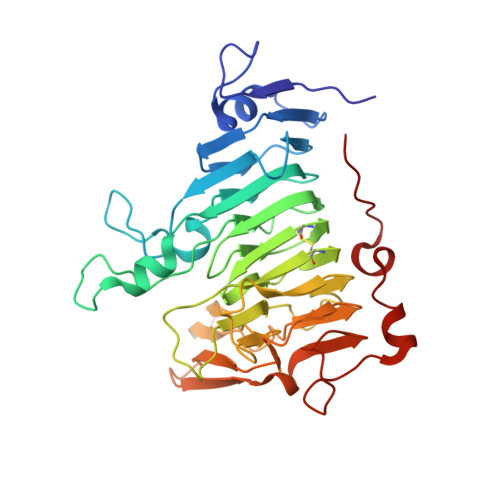Molecular basis of the activity of the phytopathogen pectin methylesterase.
Fries, M., Ihrig, J., Brocklehurst, K., Shevchik, V.E., Pickersgill, R.W.(2007) EMBO J 26: 3879-3887
- PubMed: 17717531
- DOI: https://doi.org/10.1038/sj.emboj.7601816
- Primary Citation of Related Structures:
2NSP, 2NST, 2NT6, 2NT9, 2NTB, 2NTP, 2NTQ - PubMed Abstract:
We provide a mechanism for the activity of pectin methylesterase (PME), the enzyme that catalyses the essential first step in bacterial invasion of plant tissues. The complexes formed in the crystal using specifically methylated pectins, together with kinetic measurements of directed mutants, provide clear insights at atomic resolution into the specificity and the processive action of the Erwinia chrysanthemi enzyme. Product complexes provide additional snapshots along the reaction coordinate. We previously revealed that PME is a novel aspartic-esterase possessing parallel beta-helix architecture and now show that the two conserved aspartates are the nucleophile and general acid-base in the mechanism, respectively. Other conserved residues at the catalytic centre are shown to be essential for substrate binding or transition state stabilisation. The preferential binding of methylated sugar residues upstream of the catalytic site, and demethylated residues downstream, drives the enzyme along the pectin molecule and accounts for the sequential pattern of demethylation produced by both bacterial and plant PMEs.
- School of Biological and Chemical Sciences, Queen Mary, University of London, London, UK.
Organizational Affiliation:

















